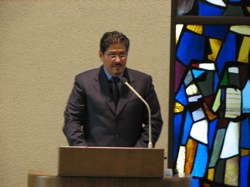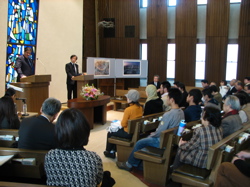Center for Interdisciplinary Study of Monotheistic Religions(CISMOR)Doshisha University
> Public Lectures > The Kingdom of Saudi Arabia and its Roll for Peace and Stability in the Middle EastPublic Lectures
Lecture (Open for the public)
The Kingdom of Saudi Arabia and its Roll for Peace and Stability in the Middle East
| Date: |
2006/12/11 15:00-17:00 |
|---|---|
| Place: | Chapel in the Divinity Hall, Imadegawa Campus, Doshisha Univ. |
| Lecture: |
Faisal Hassan Trad (Ambassador of the Kingdom of Saudi Arabia to Japan ) |
| Summary: | |
|
Mr. Faisal Hassan Trad, Ambassador of the Kingdom of Saudi Arabia to Japan, gave a lecture on Saudi Arabia’s basic position regarding present problems in the Middle East, entitled 'The Kingdom of Saudi Arabia and its Roll for Peace and Stability in the Middle East.' At the beginning of the lecture, Mr. Trad introduced the kingdom of Saudi Arabia concisely and discussed relations between Saudi Arabia and Japan, which have been close particularly in economic matters, noting the 50th anniversary of the establishment of diplomatic relation in 2005. Then he turned to the following discussion. The foreign policy of Saudi Arabia has been based on promoting world peace and stability, defending the just causes of the Arab and Islamic worlds, and adhering to international norms and agreements since its national foundation. Therefore Saudi Arabia has offered various kinds of support for maintaining international peace and security; in international politics, it was one of the states that established the United Nations, while, regionally, it was a founding member of the Arab League and the Gulf Cooperation Council (GCC). Saudi Arabia opposes all acts of terrorism, as they are forbidden by Islam, Saudi Arabia’s religion. And Saudi Arabia has pursued this policy both before and since September 11, 2001, and takes a position of fully supporting the war on terror. Furthermore, Saudi Arabia believes that disputes in the Middle East should be resolved not by acts of aggression or violence, but by negotiation and reference to international law, and that the interest of all countries in the Middle East would be best served if they fulfilled the relevant United Nations Resolutions. King Abdullah condemns the idea of clashes between civilizations and asks that it be replaced by a constructive and peaceful coexistence among civilizations, emphasizing the necessity to base relations on real dialogue, in which respect of the other guides relations between countries or nations. Saudi Arabia believes that it is the duty of wealthy countries to assist the developing countries, and so it has supported more than 70 countries during the past 30 years. Contributions to the Middle East are one kind of such assistance to the world. Today, the Middle East faces a dangerous period, particularly apparent in the situations of Lebanon, of Iran’s nuclear program, and Iraq’s hardship. Faced with these situations, Saudi Arabia has consistently sought to engage Iran in an open discourse, and with respect to Lebanon and Iraq, has helped economically and humanely in regard to the devastated social and political foundations of these countries. But Saudi Arabia is merely a reserved and cooperative helper, as these problems need to be solved by the countries themselves. But Mr. Trad pointed out that, confronted with all of these issues, it is not a suitable approach to think about them separately. What is needed is a comprehensive strategy that understands the situation as a whole, capable of going back to the root of the problem. And that problem is the Palestinian-Israeli conflict. Mr. Trad said that Israeli occupation of Palestine is in contravention to international law, and that this conflict is not merely a problem between these peoples, but an obstacle to international stability. And terrorists use the conflict to justify their violence around the world. Therefore, an important responsibility of leading powers is to move Palestine and Israel to a durable settlement. So far there are various resolutions and proposals for the solution of this conflict, but there has never been an honest and just implementation or enforcement of these agreements. A just peace plan results from diplomatic negotiations, from getting concerned parties round the table. Only when there is trust in the process can there be trust in the implementation. Mr. Trad ended his lecture by saying that when such movement toward resolution arises, then those who use this conflict to justify violence will be quieted. Tomoki Asaka (CISMOR Research Assistant / Graduate Student, School of Theology, Doshisha University) |
|
|
Handout |
|

